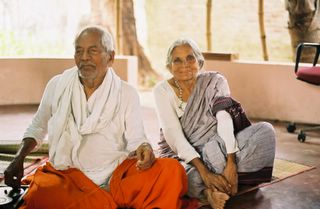The Kilvenmani Massacre (D. Willis)
Amma has awoken this morning at 3 a.m., gone into Nagappatinam on some jobs, and is back by 6:30 a.m. for morning ablutions and supervising the breakfast preparations. She seems to sleep only a few hours every night. Some nights she wakes with a vision at 2 a.m. and calls for a driver to take her to a village or official’s house, to sit and wait and gently but forcefully plead for some lands or other help for the Dalits for whom she is working hardest.
I ask our driver Muttukumar, who seems very good at getting close with all visitors, if he is the one who was summoned early this morning summoned to do all that driving. His eyes widen, and then roll and he says, “Oh no, nobody can keep up with Amma like that! She called another driver.” What is this energy and resolve?
Much of it comes from Krishnammal’s determination after the horrific massacre of 44 Dalits, mostly women and children, and one baby pinned to a tree with a knife, that took place on December 25, 1968, in Kilvenmani, a village not far from LAFTI. It was this incident that sparked a fire under Amma that is unquenchable and that has led to numerous struggles and then changes in the area around Kilvenmani.
Today we are being taken to Kilvenmani to witness what happened. We journey down bumpy back roads to a village shaded by coconuts and peepul trees. There is a stark white cement building with red trim that is a memorial the Communist Party of India Marxist-Leninist (CPI-ML) has erected along with a large arch where the road splits off from the main road. The Communists were very active in this area, at least until relative prosperity set in, and Krishnammal has worked with them on occasion since they share similar goals. Amma’s goals seem to trump the CPI-ML, however, and they cannot be happy losing members, as livelihoods improve and the circular nature of political parties gets compared to direct self-help.
We meet Subramanian and Velusamy who directly experienced the massacre, losing family members. The women had told the men to flee, expecting serious trouble, again very much about caste and their Dalit status. Local landlords came in search of what they said were Naxalites, radical Maoists who were active in the area in those days in Thanjavur (and who are still active in areas around the Andhra Pradesh/Orissa border). Suspecting that Naxalites were hiding in a long shed, but probably really knowing it was Dalit women and children and others, they set fire to the shed burning everyone alive and shooting those who tried to escape.
The next day the story was spread all over India, and it was at this point that Amma decided to take the struggle from Gandhigram near Madurai to Kilvenmani near Thanjavur. This was the beginning of LAFTI.
And as Amma tells us again when we return later to discuss Kilvenmani, “Dalits are always attacked by tsunami.”
--
Another Reminder! Letters of support for our nomination of LAFTI, Amma and Appa for the Right Livelihood Award are needed. There is a substantial cash award which can help continue LAFTI’s efforts. CESVI, a European-based NGO, has been very supportive of LAFTI these past three years, but their grant is running out.
Again, we do not need anything very long or fancy, just your letter of support and appreciation for Krishnammal and Jagannathan’s important efforts. The more letters the better. These letters can be in any language. We can also send you a model letter. Thanks so much to all of you. We need the letters April 1. Please help Amma and Appa who are doing such wonderful work!
You can send them directly to the Right Livelihood people (see the sample letter below, which has the address, and a copy to David Albert at shantinik@earthlink.net


0 Comments:
Post a Comment
<< Home